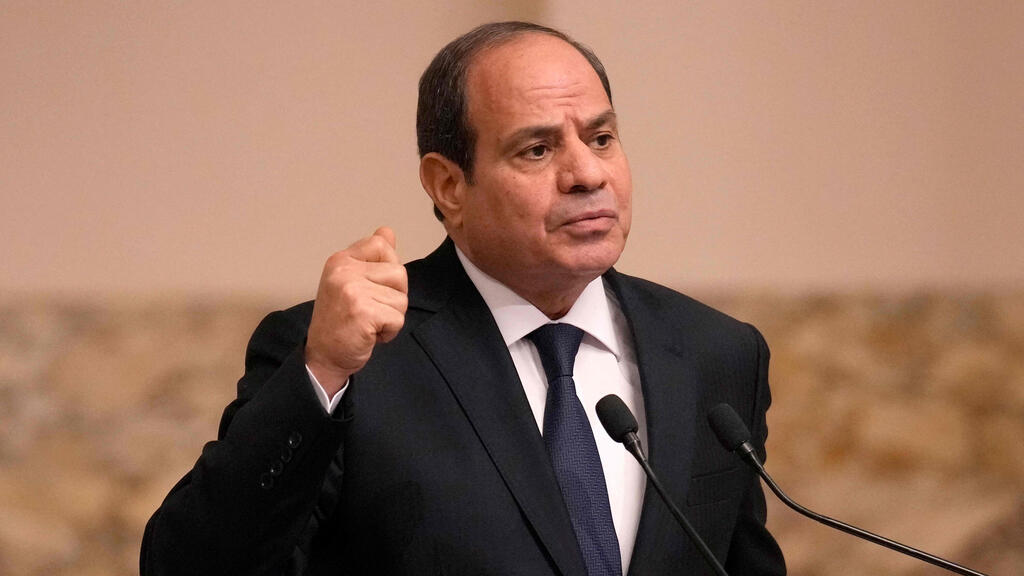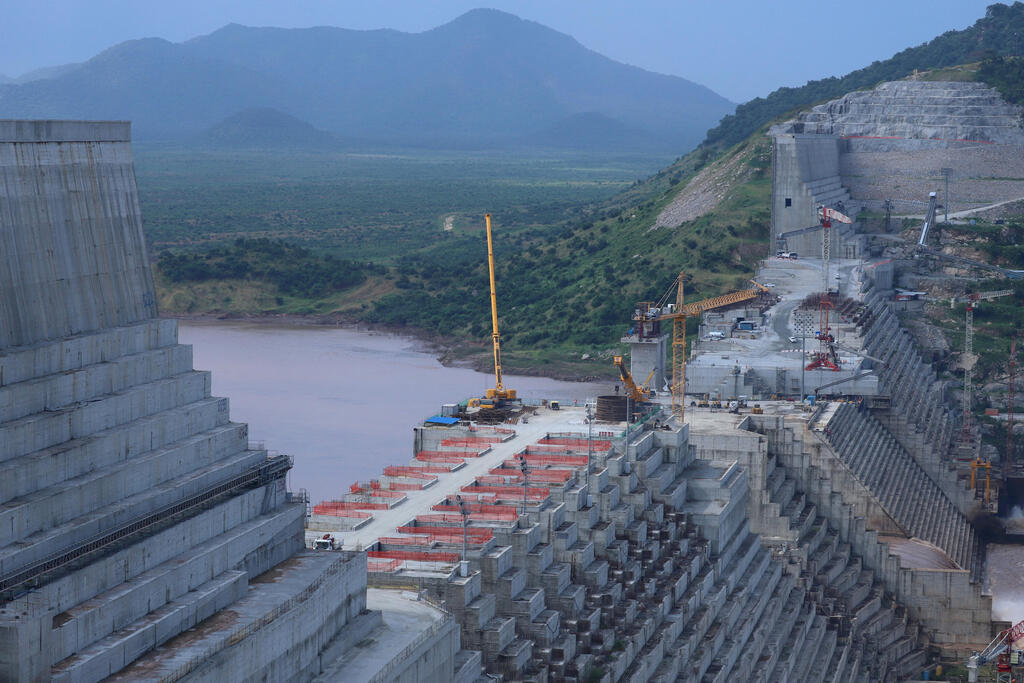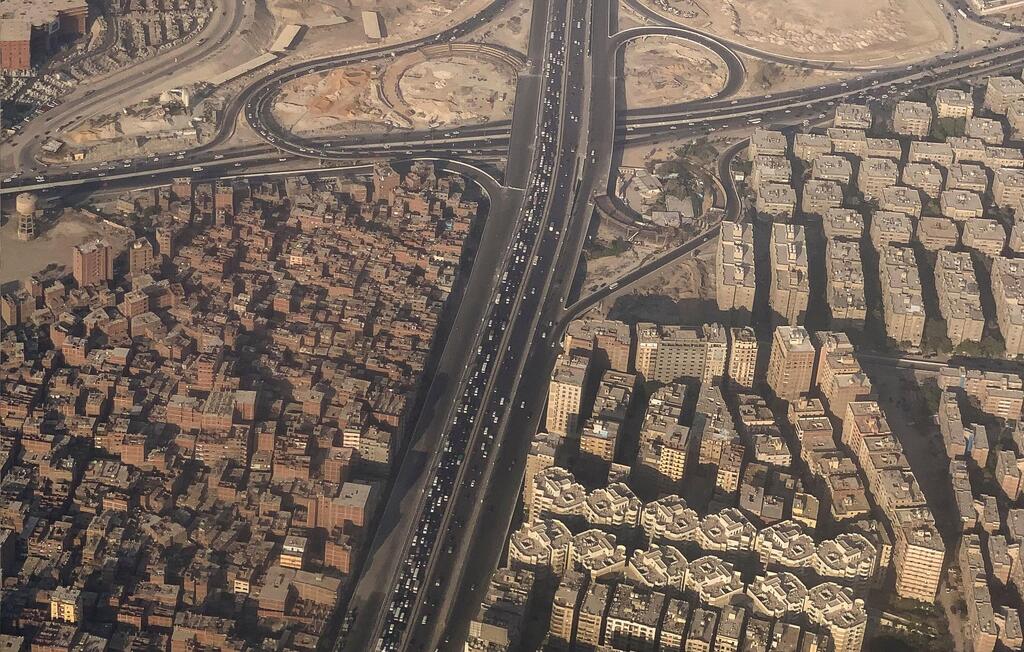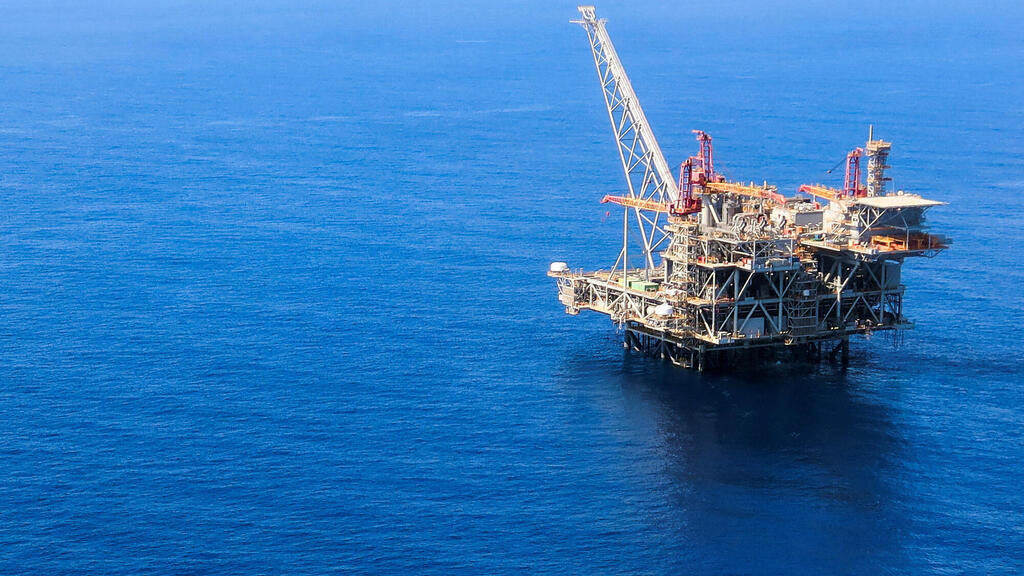Getting your Trinity Audio player ready...
Egypt, with its steadily growing population of some 113 million people (estimated to reach 160 million by 2050), is currently in the throes of a deep economic crisis, manifesting in a high inflation rate – approximately 34% as of 2023; a steep poverty rate at 29.7% as of 2019; a devaluation of the Egyptian Lira and a staggering debt to the tune of $165 billion.
A new study by the IDSF HaBithonistim movement explores the causes of this crisis, Israel’s economic relations with Egypt and the potential opportunities lying therein for Israel.
One of the main threats to Egypt’s economy is the construction of the Grand Ethiopian Renaissance Dam (GERD) on one of the Nile River’s sources. This project might cut off part of Egypt’s water supply, floating concerns of already soaring unemployment rates climbing even higher, as some 20% of the country’s population makes its living in agriculture.
This also might deliver a blow to Egypt’s ability to produce food and supply electricity for its population, sinking the country’s GDP to a debilitating low. In turn, Egypt will find itself relying heavily on foreign imports, increasing its already staggering debt and dragging it into a whirlpool of financial crisis.
If that were not enough, Egypt’s president, Abdel Fattah El-Sisi, has been fostering various grandiose projects that are costing the Egyptian tax-payer billions of dollars. He is expected to continue pouring funds into these initiatives over the next few years, which will demand additional economic aid that will dig the economy into even deeper debt.
One such undertaking is the construction of the New Nile Delta project, aiming to enhance the country’s agricultural capacity to service its rapidly growing population. Egypt hopes that upon the conclusion of the Nile Delta expansion, it will be able to independently produce vaster quantities of food at lower costs, while at the same time creating jobs for millions of citizens.
Another such project is The New Administrative City – a new state-of-the-art capital located between its current capital of Cairo to Suez. The new city is expected to sit on an area of some 725 square kilometers (280 square miles) and become home to millions of people. The estimated cost of this project is approximately $58 billion. An additional 14 cities are currently under construction across the country. Despite the fact that large swaths of the new city have already been completed, they remain unpopulated for the time being, and it is estimated that by the end of 2024, some 10,000 families will have relocated to the city.
At the same time, El-Sisi is pushing the construction of a new coastal city on an area of 170 square kilometers (66 square miles), which is planned to include new residential buildings, hotels, tourist attractions, hospitals, universities and more. This project aims to increase the country’s inflow of tourism, investments and foreign currency as a means with which to boost its economy. For this project, Egypt had signed in 2024 a financing agreement with the UAE to the tune of $35 billion. Estimates in Egypt are that total investments in this endeavor will amount to at least $150 billion.
Another problem for the Egyptian economy is its debt crunch, wherein the country’s foreign debt now exceeds $165 billion. In the 23-24 fiscal year, approximately 56% of the budget costs were allocated to covering past loans and interest, and to date, about 49% of the government’s revenues come from new loans. This creates a state of affairs in which Egypt is taking out gargantuan new loans to repay old debt and is in effect digging itself deeper into its financial hole.
In light of this crisis, on December 2022 Egypt reached an agreement with the IMF for a 3-billion-dollar loan against a commitment to overhaul its economy and instate an economic reform. Despite less than adequate performance on this issue on the part of Egypt, the IMF had agreed in March 2024 to increase the loan by another $5 billion, and compromised on the execution of the reform, which would stand on four main pillars: an alternative and more flexible rate of exchange system; a tightening of the monetary and fiscal policies; earmarking a budget for supporting under the poverty line households; and attaining a healthy balance between the public and private sectors of the country.
Egypt’s economic relations with Israel
While Egypt is contending with its economic crises, Israel continues its relatively steady trade relations with the Arab country. These ties are a ray of light in Egypt’s dismal economic situation.
One positive aspect of these relations is the Israeli tourism to the land of the Pharaohs. Every year, a large number of Israelis visit Egypt – mainly in the Sinai – boosting Egypt’s tourism. It is important to note though, that the outbreak of the Gaza war had significantly stemmed that flow.
The main engine of the economic relations between the two countries is the gas export
In addition, the annual trade volume between the two countries is hundreds of millions of dollars. These prolific relations bred joint trade meetings and conferences to expand economic collaboration and have even led to a plan to increase trade to $700 million over the next several years. Just for comparison – in 2021, the volume of trade between Israel and Egypt – excluding gas – was at some $330 million.
The main engine of the economic relations between the two countries is the gas export from Israel to Egypt – the mainstay of the trade relations. According to an agreement signed in 2018, Israel is to supply Egypt with $15 billion worth of gas over a period of ten years. This gas is intended mainly for Egypt’s energy needs but some of it is exported by Egypt to Europe, after being processed by Egypt’s LNG plants, and is an important source of revenue for the government. Later, another agreement was signed between both countries in 2022, for the expansion of the supply from Israel.
Additionally, in 2023, Egypt pressured Israel to increase the supply. The outbreak of the Gaza war significantly reduced the supply of gas from Israel and in Egypt, grievances were voiced on the frequent power cuts and the waning revenues from the LNG gas exports. Nonetheless, Israel continues to uphold its end of the deal and the partners of the Tamar gas field have even announced an increase in gas exports to Egypt starting in 2025. It is safe to assume that in light of these developments, Egypt’s dependency on Israeli gas will deepen.
In conclusion, in the current state of affairs, Egypt is entrenched in a near-crippling economic crisis that is not expected to end in the next several years. Additionally, since the start of the Gaza war, Egypt has been adopting actions and rhetoric that are contradictory to Israel’s interest. In response, Israel can – and must – bring into play the leverages it possesses in the form of control over the gas tap, its relations with the US and its diplomatic ties with Ethiopia, in order to advance Israel’s interest in the current armed conflict, i.e. the seizure of Rafah, the elimination of Hamas, the return of the Israeli hostages and the control over the Philadelphi Corridor along the Gaza-Egypt border, and ensure Egypt’s support of these interest, while receiving aid from Israel.
- Shachar Citron is a researcher at the Israel Defense And Security Forum and an analyst within a company specializing in the capital market; he is a graduate of the IDF's “Special Research Center – Shehakim" program





